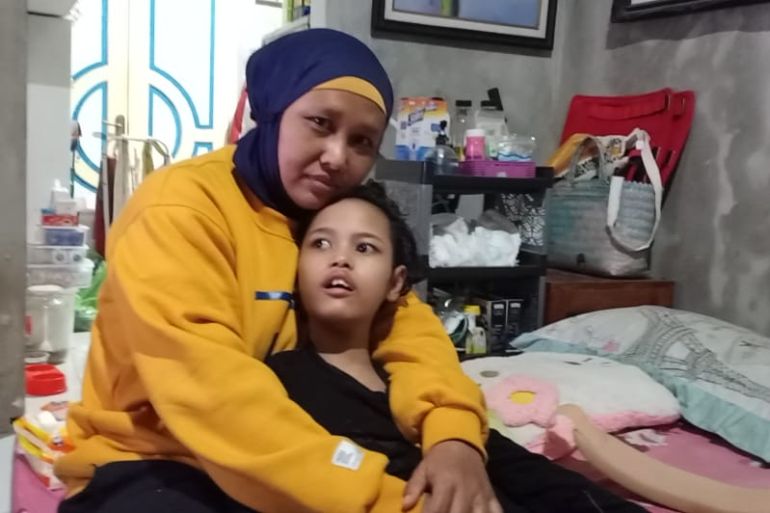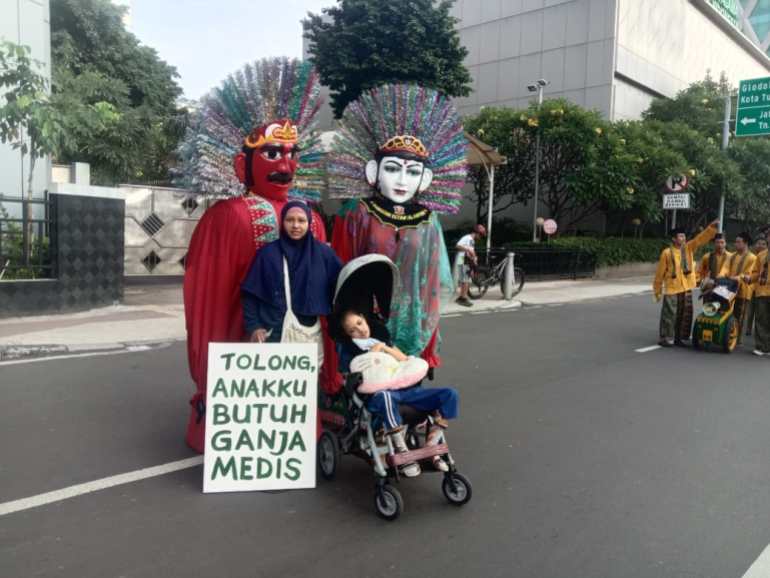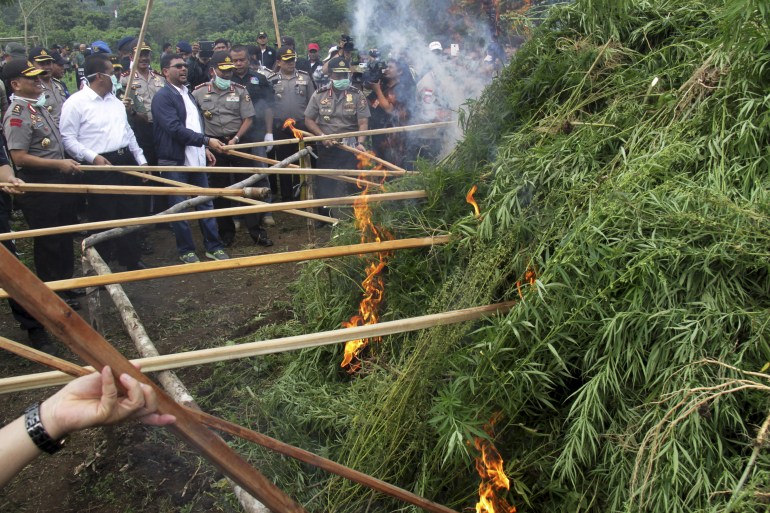Indonesian mothers fight for medical marijuana for their children
A group of mothers says the drug eases the pain of their children with conditions such as cerebral palsy and should be legal.

Medan, Indonesia – When Pika Sasi Kirana was born, there were no signs that anything was amiss.
A bouncing baby weighing 3.4kg (7.5lb), Pika soon grew into an active toddler and, by the time she reached kindergarten, was just like any of the other children in her class. An avid singer, she also loved to dance and ride her bicycle in the afternoons, filling her mother Santi Warastuti and father Sunarta with pride as they watched their only child thrive.
Keep reading
list of 4 itemsRussia jails former US embassy worker for smuggling drugs
Thailand legalises growing cannabis and eases consumption rules
US authorities find major cross-border ‘narco-tunnel’ to Mexico
But when Pika was about five years old, her health took a sudden turn for the worse. The little girl began to vomit regularly at school and suffered from fainting spells. When Warastuti, now 43, took her daughter to the doctor in Denpasar on the Indonesian island of Bali, Pika was prescribed epilepsy medication.
Her condition did not improve.
“No one ever actually said the words ‘cerebral palsy’,” Warastuti, who worked as a fashion designer, told Al Jazeera. “It just showed up one day on her doctor’s notes.”
Following the written diagnosis, Pika’s health deteriorated rapidly, with doctors seemingly unable to slow the progress of the disease or offer any solutions to make Pika more comfortable.
“Every time I visited a doctor they kept changing the doses or types of medication,” Warastuti said. “Nothing worked.”
Warastuti started to look for other ways to ease the suffering of her daughter, who was unable to do anything by herself and now needed 24-hour care. Finally, she hit upon an unlikely solution in a country known for its strict drug laws: medical marijuana.
Warastuti first heard of medical marijuana when she was working in Denpasar and her European employer told her how the drug was used in Europe and other countries to ease a range of illnesses.

When she moved back to her hometown of Yogyakarta in the hope of finding more effective therapy for Pika, Warastuti met Dwi Pratiwi, another mother and plaintiff in a Constitutional Court case, who had taken her son Musa to Australia for medical marijuana therapy.
Musa, who also had cerebral palsy, has since died. Yet, by getting to know him Warastuti was able to see firsthand how medical marijuana could help those with the disorder — that affects the ability to move and maintain balance — by helping ease muscular atrophy and enabling more comfortable sleep.
Research ordered
When Pratiwi suggested that the mothers take legal action, Warastuti did not hesitate.
Their quest to have the drug legalised in Indonesia for medical purposes has encountered stiff opposition however, and on July 20, Indonesia’s Constitutional Court rejected a motion filed by Warastuti, Pratiwi and another mother whose child has cerebral palsy for a judicial review of Indonesia’s Narcotics Law of 2009 that prohibits the use of marijuana for any reason.
According to Claudia Stoicescu, an associate professor in public health at Monash University in Indonesia, the country stands in stark contrast to its neighbours when it comes to its legal position on marijuana.
“Thailand legalised cannabis consumption in June this year and in Malaysia cannabis use for medical purposes has been legally regulated since last year,” she told Al Jazeera.
“In Indonesia, possession of cannabis carries harsh sanctions, including substantial prison time, often in overcrowded and inhumane conditions. These punishments by the criminal justice system against cannabis users are much more detrimental to the health, well-being and quality of life of the individual than the cannabis use itself.”
Warastuti says she is not surprised the Constitutional Court rejected the mothers’ bid to legalise marijuana for medical purposes but was pleased the judge ordered the Indonesian government to conduct further scientific studies into the medical uses of marijuana.
“I knew that the legal challenge was going to be rejected, but the ruling has also pushed for research into medical marijuana which we need to appreciate. In Indonesia it is hard for people to accept the legalisation of medical marijuana because they think that cannabis just gets you high, but there are good and bad ways to use it.”
“It is like a knife which is meant to be used to cut things, but can also be used to stab someone and kill them. Yet you can still buy knives everywhere,” she said.
Indonesia classifies cannabis as a Schedule 1 substance, following the UN Single Convention on Narcotic Drugs of 1961, which means that it is classified as a drug with high potential for abuse, no accepted medical use and no safe level of use under medical supervision.

However, medical researcher Stoicescu says the country should reschedule cannabis, something the World Health Organization has recommended since 2019.
“Most researchers agree that occasional cannabis use does not lead to health problems for the vast majority of people who use it. The Indonesian government, however, often claims that cannabis plays the role of a so-called ‘gateway drug’ that may lead to involvement in other illegal substances. Researchers disagree on this claim, and no causal relationship has been found between cannabis use and the use of other substances,” she said.
Looking for compromise
According to Eka Prahadian Abdurahman, the branch manager of the Addiction Recovery Community Association in Medan, North Sumatra, those who are against legalisation often argue that the drug could be used for recreational purposes.
“The government is still not willing to invest in cannabis research as a medical drug,” he said, “while many overseas studies that have been scientifically proven are also under-utilised by the government in favour of medicines made from natural ingredients other than marijuana.”
Abdurahman, whose association backs legalisation, adds that redrafting the law to allow for marijuana to be used in medical situations is not straightforward.
It is not clear how long it will take for the Indonesian government to research the potential benefits of medical marijuana, and in the meantime, Warastuti says she is thinking about potential compromises.
While she has yet to think about more legal options, she would like to lobby in the future for the government to help fund medical marijuana treatment in other countries like Australia for Indonesian citizens who wish to travel there.
She would also like the government to consider allowing individuals to buy medical marijuana from other countries for use in Indonesia without fear of prosecution if full-scale legalisation in-country is not allowed.
Back in Yogyakarta, Warastuti says the Constitutional Court’s decision is not the end of the road for her and Pika, who is now 14.
“I need to try everything to help my daughter and we will fight on and never give up,” she said.
“Maybe it is not my fate to be the one to get medical marijuana for my daughter, but hopefully we have started something, and in the future others will be able to access this medication for their children as a result of my actions.”